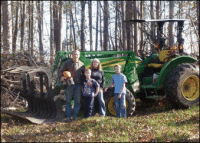Green Horizons
Volume 18, Number 1Winter 2014
 |
PHOTO BY BRIAN SCHWEISS |
| From left, the Yemms: Stephen, Treston, Deborah, Simeon. For more information on Call Before You Cut, go to www.callb4ucut.com |
Evolution of a timber sale
By Brian Schweiss
Having a timber sale on their property in Madison County, Mo. is not something Stephen and Deborah Yemm thought they would ever do. To them, all logging seemed awful. However, several storms from 2009 to 2011 brought down a number of trees and provided the catalyst to begin some management.
Stephen bought the property in 1974. While he grew up in St. Louis, he knew it was not for him.
His parents purchased adjacent property, and had two sales marked by a MDC Forester. He understood their motivations for income, but it was not something for his land. Stephen and his wife, Deborah, consider themselves "tree huggers" and did not want to cut any trees. Stephen inherited his parents' land and now manages 273 acres of woods on their 471 total acres.
A derecho, or what some call an inland hurricane, hit in 2009. This caused widespread wind damage throughout the Ozarks and got the Yemms to thinking about salvaging damaged trees. In 2010 and 2011, there was damage from smaller wind storms.
Stephen had read about Call Before You Cut and called. He received a free information packet on timber sales. The program promotes the services of a professional forester who can help mark the trees that need to come out and bid them out to get the best price.
Remembering his parents working with a forester, he contacted the Dept. of Conservation and met Becky Fletcher, his local MDC forester. Becky began working with him on a sale on the back side of their property. He chose the location to test out the process. He learned about the concept of uneven aged management, which mimics small disturbances in nature where trees are thinned and openings created to allow oaks to regenerate.
Once he was convinced that it would suit the property needs, the Yemms needed a plan for the entire tract.
A forester marking the trees provided a clear understanding of the trees being offered for sale. The forester took into account the health and value of trees to harvest and to leave. One official written bid and two unofficial bids were received for the first sale. The Yemms learned the official bidder was reputable and offering a fair price. On the second sale, they received several bids.
The successful bidder for both sales was a Master Logger. Those who have earned the Master Logger Certification have been through training and demonstrate the use of good harvesting practices.
The plan has many benefits for longterm management. It lays out a path of tracts for timber sales and followup management, such as timber stand improvement. It is also critical for the next generation. With succession planning, the property will go to the Yemms' two sons. This management plan and ones to follow will let their boys know how the woods should be cared for.
Careful timber sales have allowed for more management of their property. The sales were done in a manner that protects critical wildlife habitats and preserves the cultural resources. Added income provides a trust fund for when their sons inherit the land. A timber buyer told Stephen, if you take a daily view of it, then it looks ugly. A decade later you would see a healthy forest and a century later, your harvest will appear insignificant.